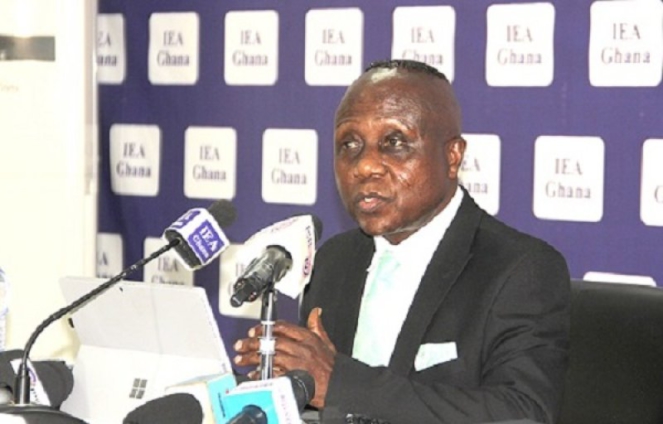The Institute of Economic Affairs (IEA) has strongly advocated for the establishment of an independent Fiscal Council (FC) in Ghana.
The institute has advised government to adopt comprehensive measures to break free from the recurrent cycle of fiscal mismanagement and dependency on International Monetary Fund (IMF) bailouts.
In a recent press release, the IEA emphasized the urgent need for a robust fiscal framework to stabilise the economy and restore policy credibility. In addition, the IEA argued that such a council will check government from going beyond its planned expenditure.
Ghana's fiscal management has long been plagued by chronic deficits where expenditures outpace revenues.
The IEA said that these deficits have traditionally been financed through extensive borrowing, both domestically and externally, leading to macroeconomic instability characterized by persistent inflation, currency depreciation, and an escalating debt burden.
"The cycle of borrowing to cover deficits, followed by economic crises and subsequent IMF bailouts, has become an all-too-familiar narrative for Ghana. It’s a vicious cycle that undermines long-term economic stability," the IEA stated in their press release.
In light of these challenges, the IEA argued for the creation of an FC as a critical reform measure. An FC would serve as an independent oversight body, providing unbiased analysis and recommendations on fiscal policy, thus ensuring adherence to fiscal rules and promoting sustainable economic management.
“The establishment of a Fiscal Council is essential for providing objective and expert oversight over fiscal policy. It will ensure that fiscal decisions are based on sound analysis and long-term considerations rather than short-term political expediency,” the IEA emphasized.
Drawing on successful models from developed countries, the IEA pointed out the benefits of having an independent fiscal watchdog. Institutions like the UK's Office for Budget Responsibility (OBR) and Sweden's Fiscal Policy Council (FPC) have demonstrated how independent fiscal bodies can significantly contribute to economic stability by evaluating government fiscal policies and providing transparent, credible forecasts.
"These international examples highlight how a well-functioning Fiscal Council can foster fiscal discipline and long-term sustainability, something that is critically needed in Ghana," it noted.
The IEA's press release outlines specific recommendations for establishing a successful FC in Ghana. These include ensuring the council's independence by having its members appointed through a rigorous, competitive process involving Parliament and the Public Services Commission.
“The Fiscal Council must be independent and composed of professionals with proven expertise in economics, public finance, and related fields. Its funding should be secured through Parliament to avoid any undue influence from the executive,” it recommended.
The IEA underscored that adopting such reforms would not only help Ghana avoid the cyclical trap of IMF bailouts but also promote a culture of fiscal responsibility and economic resilience.
“Implementing these reforms can pave the way for a more stable and self-sustaining economic future for Ghana. It is a critical step towards entrenching fiscal discipline and regaining international confidence in Ghana’s economic management,” the IEA concluded. The call for a Fiscal Council reflects a broader recognition of the need for structural reforms to address Ghana’s fiscal challenges. With the right framework in place, Ghana can achieve greater economic stability, reduce its dependency on external bailouts, and build a foundation for sustainable growth
Latest Stories
-
Most health workers in Greater Accra face workplace violence, verbal abuse common-KNUST Research
2 minutes -
Akwatia by-election: Trust police, stop fear-mongering – NDC candidate urges NPP
9 minutes -
Ken Agyapong blasts Ablakwa, demands apology over presidential jet debate
11 minutes -
NDC announces guidelines for Tamale Central by-election primaries
33 minutes -
Africa and Japan: Co-creating a future through youth, innovation, and partnership
43 minutes -
Kennedy Agyapong: Helicopter crash should end ‘unnecessary’ politicisation of national issues
49 minutes -
Newmont donates over $42.2m worth of essential medical supplies and equipment to health facilities in 36 countries
55 minutes -
Photos: Police leadership meets GJA executives
1 hour -
IGP assures journalists of protection ahead of Akwatia by-election
2 hours -
Unauthorised ‘No Fees Stress’ billboard at Flowerpot Roundabout removed after backlash
2 hours -
8 suspects arrested in connection with Ablekuma North election violence – IGP
2 hours -
GJA President calls for stronger collaboration between media and security services
2 hours -
Extra Gold refutes allegations of diverting Birim River
2 hours -
GJA commends police for swift action in Ablekuma North assault on journalists
2 hours -
‘The Ga State is proud of you’ – Ga Mantse applauds Richard Nii Armah Quaye
2 hours

